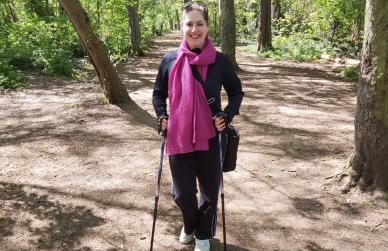The Government have announced that from 19 July 2021, social distancing restrictions will finally be lifted in England. Many people are dubbing this as 'Freedom Day'. However, as Carla King discusses in her latest blog piece, many people with MS are feeling more apprehensive than jubilant at this news.
'Freedom Day', as it's dubbed, is around the corner. This conjures up images of street parties, people joyously removing their masks, hugging strangers and skipping into the distance. Everything will be back to normal again.
Except that life will never be the same again.
It's safe to say we humans don't generally like change. Some railed against the 'new' normal, saying it impinged on their civil liberties, whilst others embraced something which looked like it would stick around for a very long time. Humans have such capacity to adapt and to find alternative workarounds. I have previously written that people with MS already have the experience and resilience to deal with sudden and impactful change, but no layperson could have foreseen how long this would be with us, nor its effects.
I was asked to write this piece as I'm a positive, yet realistic, blogger. I write as someone considered clinically extremely vulnerable (CEV), who shielded for 16 months. It's important that our feelings are acknowledged, and whilst there are CEV people who think differently, I know that of the millions of CEV people, I am not alone in this thinking.
Whilst for me, shielding has ended to some extent, this is not true of everyone. (Covid-19: 'For us it's not freedom day, is it?' - BBC News). Some are petrified, others are nervous, having sacrificed a lot to look after their health, only for all restrictions to lift at once. Surveying social media after the government briefing, the biggest issue seemed to be the loss of protections afforded by wearing masks or social distancing. Like most people, those shielding want to reclaim their lives.
It's too easy to assume that CEV people have been conditioned by fear or our mental health has suffered. This is too simplistic when there is much more behind why we do what we do. Surely those shielding are protected now that they have had the vaccine? As a group, we are acutely aware that no-one knows how long this protection may last: 6 months? A year? The focus is on correlating cases with deaths, but not enough on the risks surrounding Long Covid, at least not yet, as there hasn't been sufficient time.
It's logical to think that cases will rise steeply once people mingle unhindered after 19 July. This is probably an acceptable risk to many, but not so to a concerned CEV group. Equating this virus to the flu feels like comparing apples to vats of orange juice. The word 'pandemic' is appropriate here.
CEV people feel they have lost much more freedom than most, only repeatedly to be forgotten. This is not the first time during the pandemic that those shielding have felt overlooked in Covid-related plans. For example, telling us in our final letter to exercise caution is problematic, when those around us aren't always doing the same.
It's easy to have an easy-going approach to your health. I, too, fell into this trap until 2005 when, overnight, I became blind with optic neuritis. I was young, healthy. I never thought that in less than ten years, I would face multiple chronic conditions, least of all MS, with no familial history. Let's face it, in the context of bad things happening to good people, I have form, and I would prefer not to add to the list.
Perhaps an alarming consequence of the government revoking previously strong guidance to work from home, is that shielders no longer have Covid-specific security at their workplace. I wonder how many have been pressured to return to the workplace by their employer, particularly in London where there is a huge push for the city to be busy again? How many will be denied the adjustment of working from home, where previously an entire workforce was doing this successfully? What of the dilemma for those working with the public, for example in retail, now that customers need no longer wear masks? No shielding means no supporting shielding letter.
Understandably, everyone is tired of lockdowns, restrictions and home-schooling, including the CEV. But, more recently, I've noticed a societal shift. Covid rhetoric has transformed almost overnight from 'we're in this together' to 'don't be muzzled by a mask.' I have witnessed a disturbing lack of empathy, usually starting with 'I feel sorry for the vulnerable, but...' or 'it's only the vulnerable.' Disability hate crime is rising sharply, and this 'us and them' mentality is troubling.
With my coaching clients, I talk about their concerns, and what is within their influence and control. We can't control the behaviour of those around us, but we can make choices that influence our thoughts and how we react to change.
So, thinking of what is within my control, I will continue to:
- Wear a mask in public indoor spaces, wash hands, etc., as I have done throughout the pandemic
- Limit time on social media.
- Distance myself from disputes on the topic.
- Connect with friends, whether online or outdoors.
- Focus on reputable sources, to keep my thoughts and perspective in check.
I'm not convinced we've seen the last of restrictions, but I know the situation won't change any time soon. Real freedom is doing what we feel is right for ourselves, without judgment. Our one request: whatever your opinion, please respect our choices.
Carla King is a Career Coach and was diagnosed with RRMS in 2008, having had her first relapse in 2005. Follow Carla on Twitter/X @CarlaKCoach or via her blog: My MS Bully and Me.



